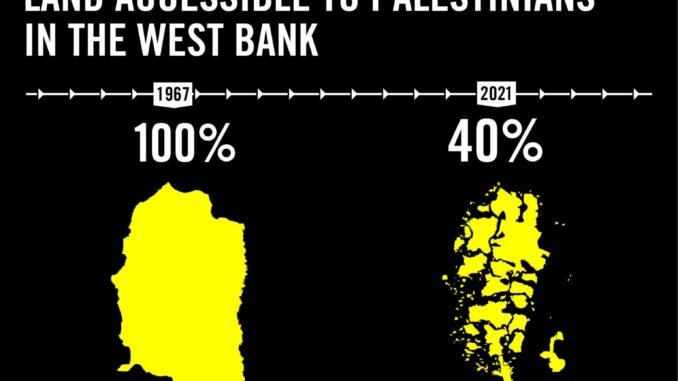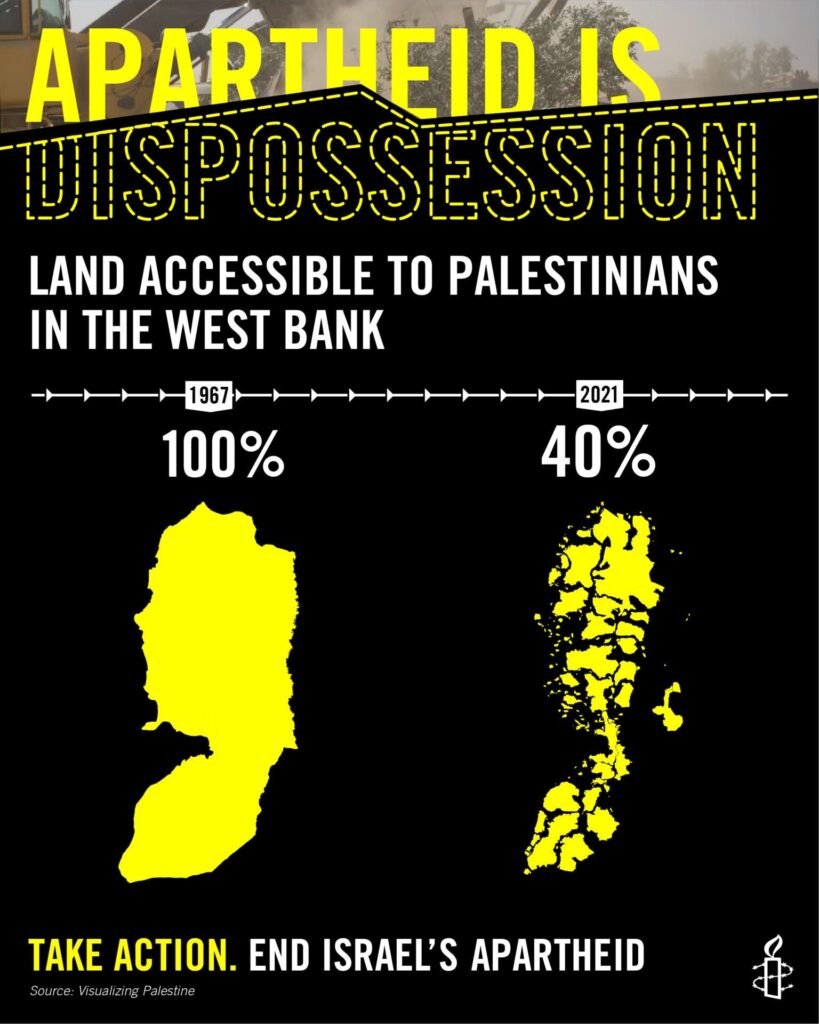

Amnesty International’s new research report, Israel’s Apartheid Against Palestinians: Cruel System of Domination and Crime Against Humanity shows that Israeli authorities impose a system of domination and oppression against the Palestinian people in Israel and the Occupied Palestinian Territories (OPT), and against Palestinian refugees. Laws, policies, and institutional practices all work to expel, fragment, and dispossess Palestinians of their land and property, and deprive Palestinians of their human rights. We conclude this treatment amounts to an institutionalized regime of oppression and domination defined as apartheid under international law.
Amnesty’s research, campaigns, advocacy, and statements pertaining to Israel are focused on the actions of the Israeli government — they are not, and never will be, a condemnation of Judaism or the Jewish people. Antisemitism is antithetical to everything Amnesty represents as a human rights organization.
Apartheid is a violation of public international law, a grave human rights violation, and a crime against humanity. It constitutes both a system (formed of laws, policies, and practices) and a crime (specific acts). The term “apartheid” was originally used to refer to a political system in South Africa which explicitly enforced racial segregation, and the domination and oppression of one racial group by another. It has since been adopted by the international community to condemn and criminalize such systems and practices wherever they occur in the world.
Three main international treaties prohibit and/or explicitly criminalize apartheid: the International Convention on the Elimination of All Forms of Racial Discrimination (ICERD); the International Convention on the Suppression and Punishment of the Crime of Apartheid (Apartheid Convention); and the Rome Statute of the International Criminal Court (Rome Statute).
The Apartheid Convention and the Rome Statute define apartheid as a crime against humanity, committed when any ‘inhuman’ or ‘inhumane’ act is perpetrated in the context of an ‘institutionalized regime’ of systematic ‘oppression’ and ‘domination’ by one racial group over another, with the intent to maintain that system. Inhuman/inhumane acts include unlawful killing and serious injury, torture, forcible transfer, persecution, and the denial of basic rights and freedoms.
Israel continued to discriminate against Palestinian citizens of Israel in areas of planning, budget allocation, policing and political participation. According to the Adalah-The Legal Center for Arab Minority Rights in Israel, Israel maintains over 65 laws that discriminate against Palestinians.
Local Palestinian councils in Israel went on strike to protest against discrimination in the distribution of the state budget for local councils. The vast majority of Palestinians in Israel, comprising over 20% of the total population, live in around 139 towns and villages. They received only 1.7% of the state budget for local councils.
Last August, Adalah and the Arab Center for Alternative Planning filed a petition to the Israeli Supreme Court on behalf of 10 local Palestinian councils and dozens of Palestinian citizens of Israel against government policy discriminating against these communities in the distribution of housing, construction and land development benefits compared to neighbouring Jewish communities that enjoy higher socio-economic status and have access to such benefits. Israel continued to deny Palestinians from the West Bank and Gaza married to Palestinian citizens of Israel the right to nationality by enforcing the discriminatory Entry to Israel Law.
In December, the magistrate court in Krayot, near Haifa, rejected a petition for access to education by Palestinian citizens of Israel living in Karmiel, citing the discriminatory Nation State Law. The decision said that establishing an Arabic school in the town or funding transport for its Palestinian residents to study in Arabic schools in nearby communities would undermine the town’s “Jewish character”.
Also in December, the Israeli Health Ministry began the distribution of COVID-19 vaccines that excluded the nearly 5 million Palestinians who live under Israeli military occupation in the West Bank and Gaza Strip.
Amnesty International is providing the following wide-ranging recommendations to the Israeli government and other relevant stakeholders to dismantle the system of apartheid against Palestinians and end the associated human rights violations. We are making recommendations to the Israeli authorities covering laws, practices, and policies that relate to Palestinians in general, as well as specific ones relating to each of the domains of control – Israel, East Jerusalem, the rest of the West Bank and the Gaza Strip – and Palestinian refugees outside Israel and the OPT. We also include a few recommendations for the Palestinian authorities.
RECOMMENDATIONS TO THE GOVERNMENT OF ISRAEL
- End the system of apartheid by dismantling measures of discrimination, segregation and oppression currently in place against the Palestinian population and undertake a review of all laws, regulations, policies, and practices that discriminate on racial, ethnic or religious grounds, and repeal or amend them to bring them into line with international human rights law and standards — in particular the government of Israel’s obligations to ensure the principle of non-discrimination under international law.
- Grant equal and full human rights to all Palestinians in Israel and the OPT in line with principles of international human rights law and without discrimination, while ensuring respect for protections guaranteed for Palestinians in the OPT under international humanitarian law.
- Immediately order all state authorities to end and refrain from all future conduct that violates international law, including: forcible transfer of population, arbitrary arrest, administrative detention, torture and other ill-treatment, unlawful killings and infliction of injuries, and arbitrary restrictions on Palestinians’ freedom of movement and residence in their communities; and respect their right to family life, and their rights to access livelihoods, housing, food, water, essential healthcare services, and education.

Leave a Reply